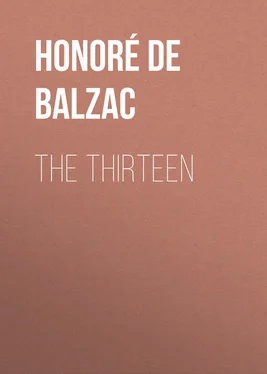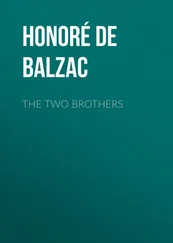Honoré Balzac - The Thirteen
Здесь есть возможность читать онлайн «Honoré Balzac - The Thirteen» — ознакомительный отрывок электронной книги совершенно бесплатно, а после прочтения отрывка купить полную версию. В некоторых случаях можно слушать аудио, скачать через торрент в формате fb2 и присутствует краткое содержание. Жанр: literature_19, foreign_antique, foreign_prose, на английском языке. Описание произведения, (предисловие) а так же отзывы посетителей доступны на портале библиотеки ЛибКат.
- Название:The Thirteen
- Автор:
- Жанр:
- Год:неизвестен
- ISBN:нет данных
- Рейтинг книги:3 / 5. Голосов: 1
-
Избранное:Добавить в избранное
- Отзывы:
-
Ваша оценка:
- 60
- 1
- 2
- 3
- 4
- 5
The Thirteen: краткое содержание, описание и аннотация
Предлагаем к чтению аннотацию, описание, краткое содержание или предисловие (зависит от того, что написал сам автор книги «The Thirteen»). Если вы не нашли необходимую информацию о книге — напишите в комментариях, мы постараемся отыскать её.
The Thirteen — читать онлайн ознакомительный отрывок
Ниже представлен текст книги, разбитый по страницам. Система сохранения места последней прочитанной страницы, позволяет с удобством читать онлайн бесплатно книгу «The Thirteen», без необходимости каждый раз заново искать на чём Вы остановились. Поставьте закладку, и сможете в любой момент перейти на страницу, на которой закончили чтение.
Интервал:
Закладка:
A great many curious things might be told of their rivals, the Compagnons du Devior , of all the different sects of workmen, their manners and customs and brotherhoods, and of the resemblances between them and the Freemasons; but there, these particulars would be out of place. The author will merely add, that before the Revolution a Trempe-la-Soupe had been known in the King’s service, which is to say, that he had the tenure of a place in His Majesty’s galleys for one hundred and one years; but even thence he ruled his guild, and was religiously consulted on all matters, and if he escaped from the hulks he met with help, succor, and respect wherever he went. To have a chief in the hulks is one of those misfortunes for which Providence is responsible; but a faithful lodge of devorants is bound, as before, to obey a power created by and set above themselves. Their lawful sovereign is in exile for the time being, but none the less is he their king. And now any romantic mystery hanging about the words Ferragus and the devorants is completely dispelled.
As for the Thirteen, the author feels that, on the strength of the details of this almost fantastic story, he can afford to give away yet another prerogative, though it is one of the greatest on record, and would possibly fetch a high price if brought into a literary auction mart; for the owner might inflict as many volumes on the public as La Contemporaine. 1 1 A long series of so-called Memoirs, which appeared about 1830.
The Thirteen were all of them men tempered like Byron’s friend Trelawney, the original (so it is said) of The Corsair . All of them were fatalists, men of spirit and poetic temperament; all of them were tired of the commonplace life which they led; all felt attracted towards Asiatic pleasures by all the vehement strength of newly awakened and long dormant forces. One of these, chancing to take up Venice Preserved for the second time, admired the sublime friendship between Pierre and Jaffir, and fell to musing on the virtues of outlaws, the loyalty of the hulks, the honor of thieves, and the immense power that a few men can wield if they bring their whole minds to bear upon the carrying out of a single will. It struck him that the individual man rose higher than men. Then he began to think that if a few picked men should band themselves together; and if, to natural wit, and education, and money, they could join a fanaticism hot enough to fuse, as it were, all those separate forces into a single one, then the whole world would be at their feet. From that time forth, with a tremendous power of concentration, they could wield an occult power against which the organization of society would be helpless; a power which would push obstacles aside and defeat the will of others; and the diabolical power of all would be at the service of each. A hostile world apart within the world, admitting none of the ideas, recognizing none of the laws of the world; submitting only to the sense of necessity, obedient only from devotion; acting all as one man in the interests of the comrade who should claim the aid of the rest; a band of buccaneers with carriages and yellow kid gloves; a close confederacy of men of extraordinary power, of amused and cool spectators of an artificial and petty world which they cursed with smiling lips; conscious as they were that they could make all things bend to their caprice, weave ingenious schemes of revenge, and live with the life in thirteen hearts, to say nothing of the unfailing pleasure of facing the world of men with a hidden misanthropy, a sense that they were armed against their kind, and could retire into themselves with one idea which the most remarkable men had not, – all this constituted a religion of pleasure and egoism which made fanatics of the Thirteen. The history of the Society of Jesus was repeated for the Devil’s benefit. It was hideous and sublime.
The pact was made; and it lasted, precisely because it seemed impossible. And so it came to pass that in Paris there was a fraternity of thirteen men, each one bound, body and soul, to the rest, and all of them strangers to each other in the sight of the world. But evening found them gathered together like conspirators, and then they had no thoughts apart; riches, like the wealth of the Old Man of the Mountain, they possessed in common; they had their feet in every salon, their hands in every strong box, their elbows in the streets, their heads upon all pillows, they did not scruple to help themselves at their pleasure. No chief commanded them, nobody was strong enough. The liveliest passion, the most urgent need took precedence – that was all. They were thirteen unknown kings; unknown, but with all the power and more than the power of kings; for they were both judges and executioners, they had taken wings that they might traverse the heights and depths of society, scorning to take any place in it, since all was theirs. If the author learns the reason of their abdication, he will communicate it.
And now the author is free to give those episodes in the History of the Thirteen which, by reason of the Parisian flavor of the details or the strangeness of the contrasts, possessed a peculiar attraction for him.
Paris
I. FERRAGUS, CHIEF OF THE DEVORANTS
CHAPTER I. MADAME JULES
Certain streets in Paris are as degraded as a man covered with infamy; also, there are noble streets, streets simply respectable, young streets on the morality of which the public has not yet formed an opinion; also cut-throat streets, streets older than the age of the oldest dowagers, estimable streets, streets always clean, streets always dirty, working, laboring, and mercantile streets. In short, the streets of Paris have every human quality, and impress us, by what we must call their physiognomy, with certain ideas against which we are defenceless. There are, for instance, streets of a bad neighborhood in which you could not be induced to live, and streets where you would willingly take up your abode. Some streets, like the rue Montmartre, have a charming head, and end in a fish’s tail. The rue de la Paix is a wide street, a fine street, yet it wakens none of those gracefully noble thoughts which come to an impressible mind in the middle of the rue Royale, and it certainly lacks the majesty which reigns in the Place Vendome.
If you walk the streets of the Ile Saint-Louis, do not seek the reason of the nervous sadness that lays hold upon you save in the solitude of the spot, the gloomy look of the houses, and the great deserted mansions. This island, the ghost of fermiers-generaux , is the Venice of Paris. The Place de la Bourse is voluble, busy, degraded; it is never fine except by moonlight at two in the morning. By day it is Paris epitomized; by night it is a dream of Greece. The rue Traversiere-Saint-Honore – is not that a villainous street? Look at the wretched little houses with two windows on a floor, where vice, crime, and misery abound. The narrow streets exposed to the north, where the sun never comes more than three or four times a year, are the cut-throat streets which murder with impunity; the authorities of the present day do not meddle with them; but in former times the Parliament might perhaps have summoned the lieutenant of police and reprimanded him for the state of things; and it would, at least, have issued some decree against such streets, as it once did against the wigs of the Chapter of Beauvais. And yet Monsieur Benoiston de Chateauneuf has proved that the mortality of these streets is double that of others! To sum up such theories by a single example: is not the rue Fromentin both murderous and profligate!
These observations, incomprehensible out of Paris, will doubtless be understood by musing men of thought and poesy and pleasure, who know, while rambling about Paris, how to harvest the mass of floating interests which may be gathered at all hours within her walls; to them Paris is the most delightful and varied of monsters: here, a pretty woman; farther on, a haggard pauper; here, new as the coinage of a new reign; there, in this corner, elegant as a fashionable woman. A monster, moreover, complete! Its garrets, as it were, a head full of knowledge and genius; its first storeys stomachs repleted; its shops, actual feet, where the busy ambulating crowds are moving. Ah! what an ever-active life the monster leads! Hardly has the last vibration of the last carriage coming from a ball ceased at its heart before its arms are moving at the barriers and it shakes itself slowly into motion. Doors open; turning on their hinges like the membrane of some huge lobster, invisibly manipulated by thirty thousand men or women, of whom each individual occupies a space of six square feet, but has a kitchen, a workshop, a bed, children, a garden, little light to see by, but must see all. Imperceptibly, the articulations begin to crack; motion communicates itself; the street speaks. By mid-day, all is alive; the chimneys smoke, the monster eats; then he roars, and his thousand paws begin to ramp. Splendid spectacle! But, O Paris! he who has not admired your gloomy passages, your gleams and flashes of light, your deep and silent cul-de-sacs , who has not listened to your murmurings between midnight and two in the morning, knows nothing as yet of your true poesy, nor of your broad and fantastic contrasts.
Читать дальшеИнтервал:
Закладка:
Похожие книги на «The Thirteen»
Представляем Вашему вниманию похожие книги на «The Thirteen» списком для выбора. Мы отобрали схожую по названию и смыслу литературу в надежде предоставить читателям больше вариантов отыскать новые, интересные, ещё непрочитанные произведения.
Обсуждение, отзывы о книге «The Thirteen» и просто собственные мнения читателей. Оставьте ваши комментарии, напишите, что Вы думаете о произведении, его смысле или главных героях. Укажите что конкретно понравилось, а что нет, и почему Вы так считаете.












